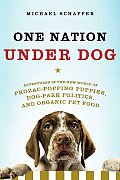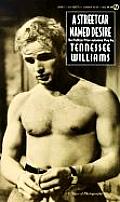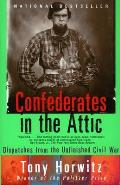 Describe your latest project.
Describe your latest project.I wanted to write a book about how we became a pampered-pet nation. A few years ago, my wife and I adopted a wonderful mess of a Saint Bernard. I'd never had a dog before. So we did what anyone would do: looked at the various dog-owning friends and neighbors around us and followed their lead. Which meant entering a world of canine antidepressants, organic kibble, sun-dappled "day spas" for when we went out of town, chew toys promising mental enrichment, and pitched debates over rival dog-training philosophies. My in-laws, who'd always had their own well-loved dogs, thought this was bizarre. But in our world ? and, as I discovered, in much of the country ? it was quite normal. I'd been a newspaper reporter long enough to think that when the definition of normal changes so rapidly, something interesting is going on.
I wound up with a project that was one part straightforward reporting on an unlikely $43-billion corner of the economy ? mobile dog groomers! upscale pet shampoo! ? that seems to be defying the recession, one part zany tour through pet-obsessed country, and one part thoughtful mediation on what it all means. Surprisingly, it's less a story about our animals than ourselves, how the way we care for, fight over, legally regulate, and even mourn pets reflect bigger changes in our society. In the aisles of a PetSmart or the corners of a dog park, you can find our modern understanding of everything from what family means to what nutrition is ? not to mention shades of the culture wars, contemporary legal strife, the rise of the two-career household, and the decline of the old-fashioned community. It turned out that Murphy, my sweet, dumb lug of a dog, held a pretty good mirror to his country.
If someone were to write your biography, what would be the title and subtitle?
If the editor weren't very good, it would end up with some cheesy title like Pressed Up against the Window Pane, or something like that, with a subtitle that employed lots of long scholarly words about belonging and self-consciousness. My parents were in the foreign service, so I grew up moving to all of these distant, humid, mustachioed countries. My major emotional memory of being a kid is just wanting to be a normal American, which I was pretty sure didn't entail spending junior high in Bangladesh. But when we did come home, I always felt like I'd made this science out of examining how normal folks lived ? which, of course, made it quite difficult to be one of 'em (if there even is such a thing). So I became a journalist. Go figure.
Offer a favorite sentence or passage from another writer.
 Then what is good? The obsessive interest in human affairs, plus a certain amount of compassion and moral conviction, that first made the experience of living something that must be translated into pigment or music or bodily movement or poetry or prose or anything that's dynamic and expressive — that's what's good for you if you're at all serious in your aims. William Saroyan wrote a great play on this theme, that purity of heart is the one success worth having. 'In the time of your life — live!' That time is short and it doesn't return again. It is slipping away while I write this and while you read it, and the monosyllable of the clock is Loss, Loss, Loss, unless you devote your heart to its opposition. —Tennessee Williams, from the introduction to A Streetcar Named Desire
Then what is good? The obsessive interest in human affairs, plus a certain amount of compassion and moral conviction, that first made the experience of living something that must be translated into pigment or music or bodily movement or poetry or prose or anything that's dynamic and expressive — that's what's good for you if you're at all serious in your aims. William Saroyan wrote a great play on this theme, that purity of heart is the one success worth having. 'In the time of your life — live!' That time is short and it doesn't return again. It is slipping away while I write this and while you read it, and the monosyllable of the clock is Loss, Loss, Loss, unless you devote your heart to its opposition. —Tennessee Williams, from the introduction to A Streetcar Named Desire
(Do I get extra points for quoting one writer as he's quoting another?)
Have you ever made a literary pilgrimage?
I went to college at Columbia University in New York in the early '90s. One thing I'd known about the school in advance was that it had been a major haunt of the Beat Generation writers I idolized. So I quickly hightailed it across the street to the West End bar, where Ginsberg supposedly met Kerouac and all sorts of literary endeavors were launched. But it turned out the bar had recently been sold and reconfigured as a college bar with beer pong. Instead of finding a bunch of hipsters and radicals and poets in berets, I found a bunch of frat boys in baseball hats and a bouncer who demanded ID. At the time, this was heartbreaking. Looking back, though, it seems a pretty good symbol of the times.
What makes your favorite pair of shoes better than the rest?
They slip on and off! When I moved from being a working beat reporter to writing a book out of my own house, I made up a bunch of rules designed to keep me from spending my days watching the foreign parliamentary debates on C-SPAN or immersing myself in Railroad Tycoon. One rule: Not only would I change out of my pajamas, but from 9:00 a.m. until quitting time, I'd wear shoes. My favorite pair, though, are old enough that they slide right off. Hey, those TV shows aren't going to watch themselves.
Fahrenheit, Celsius, or Kelvin?
I'm American. I can't think in Celsius. Or meters. Or grams. Whenever I go abroad, I find myself doing complicated math in my head to figure out how much an apple weighs. I recognize the absurdity of a temperature system where freezing isn't zero, or a distance measurement where the key units involve multiples of 3, 12, 1760, and 5280 rather than, like, 10, 100, and 1000. So call me a self-loathing Celsius.
Name the best television series of all time.
It's a total cliché to say so, but The Wire was just amazing. When I first watched it, I realized: This was why I'd wanted to become a journalist. The genius of the show is how it individualizes all these characters ? all those faceless corner boys, all the myriad uniformed cops, all those folks shuffling through the 'hood ? that we in the rest of society so often lump into undifferentiated masses of character types. There wound up being dozens and dozens of characters whose motivations, for good or ill or both, we knew and understood. It was fiction, of course, but the degree of research really amounted to a wiring diagram of how power worked in an American city. I was a City Hall reporter at the time in Philadelphia, whose poverty and struggles are not so different from Baltimore's, and I wished I could have shined a light on just some small percent of the truth that the show laid bare.
On a clear and cold day, do you typically get outside into the sunshine or stay inside where it's warm?
I feel guilty if I don't go outside before noon ? as if I'm somehow missing out on the magic of the world. Also, did I mention I have a Saint Bernard? On those rare days where I could convince myself that there's nothing worth seeing out there, he pretty much obliges me to hustle past the door whether I want to or not.
 Recommend five or more books on a single subject of personal interest or expertise.
Recommend five or more books on a single subject of personal interest or expertise.
Five Great Books Where One Little Thing Explains Lots of Big Things
This wound up being the basic model for my book One Nation under Dog ? how the way we've come to live with modern pets explains all about our society and culture and economy and so on. Luckily, I had a bunch of role models for small chunks of this:
How Soccer Explains the World by Franklin Foer
Foer travels around the soccer universe and brings back a book about how this simple game of feet and goal has come to reflect the different corners of diverse humanity where it is played. He has a lot of fun doing so.
The American Way of Death by Jessica Mitford
Mourning is an ancient ritual, steeped in the culture of our ancestors, right? No way. Mitford brought an investigative reporter's zeal to examining the various ways people were making a buck off death, recasting these supposedly antique rites in the process.
Bobos in Paradise: The New Upper Class and How They Got There by David Brooks
Brooks loves marketing data, all right. In this book, the columnist dissects, say, the popularity of Viking ranges and slate showers in order to tell a much bigger story about U.S. culture.
The Sushi Economy: Globalization and the Making of a Modern Delicacy by Sasha Issenberg
Issenberg looks at the global popularity of sushi, which presents itself as an unadorned, ancient Asian delicacy. He finds it's anything but: Its modern incarnation came to Japan only relatively recently, as a result of complicated global interactions of war, economics, and technology. Its arrival in your local food court was the product of even more complicated phenomena that say a lot about the forces shaping our world.
Confederates in the Attic: Dispatches from the Unfinished Civil War by Tony Horwitz
OK, the Civil War isn't a little thing. But it is a very old thing, and Horwitz's road trip went through places where the war seemed to live on in modern schemes or contemporary controversies. He uses a conflict that is more than a century old to explain truths about today's America.